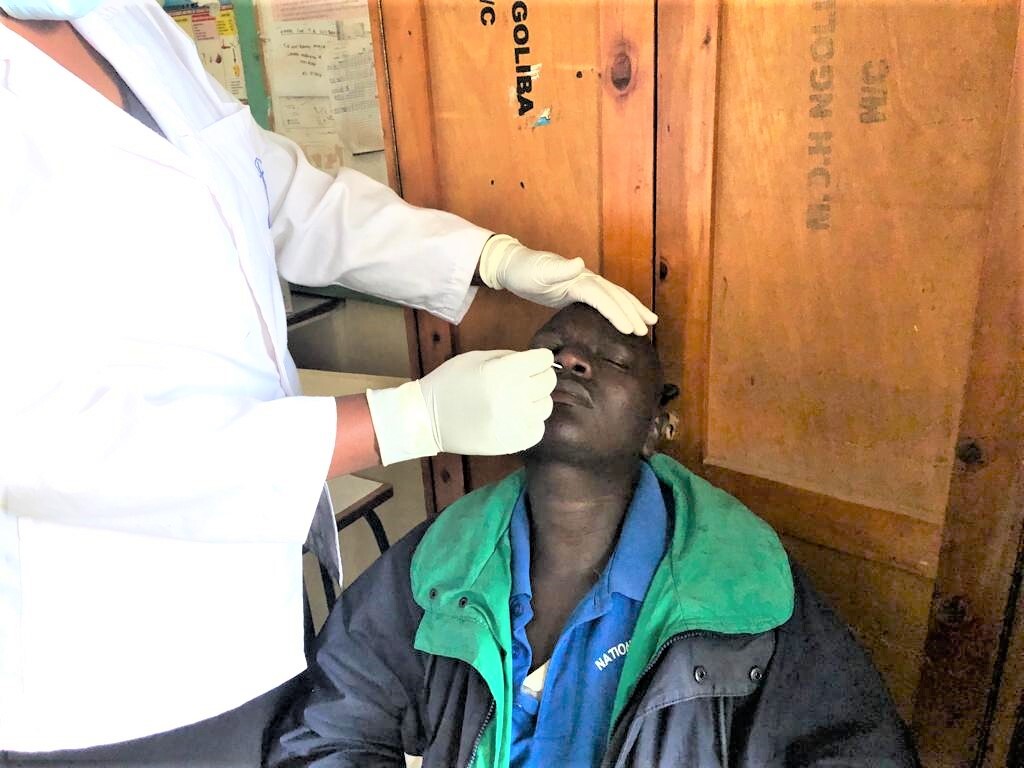COVID-19 Integration Model in Kenya
The goal of the COVID-19 integration model is to organize and manage services so vulnerable people of all ages get screened for COVID-19, those eligible for COVID-19 testing get tested, and those identified positive for COVID-19 get the care they need in a timely, efficient, and cost-effective manner. The CCA Kenya team strives to ensure COVID-19 services integrate into maternal and child health (MCH), TB, and HIV services.
Providing essential COVID-19 health services in an integrated manner can increase the efficiency of services for vulnerable patients and reduce costs for the client by seeing a single clinician to provide multiple services. Moreover, the additional time to provide COVID-19 screening was only four minutes in the HIV clinic and five minutes in MCH clinics, with those requiring the test getting their results within 20 minutes. This time has been recouped from the average waiting time of 30 minutes for other services in these clinics as COVID services are offered before the other routine services.
Systematically integrating COVID-19 services into TB, MCH, and HIV clinics can lead to more efficient and cost-effective programs by 1) increasing the use of health services; 2) improving people’s access to COVID-19 testing services; 3) reducing facility-related stigma around contracting COVID-19; 4) improving surveillance of COVID-19 among the vulnerable population; 5) avoiding added complexity of TB care through counseling on COVID prevention measures; 6) receiving COVID-19 care through familiar health providers leads to treatment retention; 7) integration improves ownership at the facility level; 8) minimizes incomplete referrals of positive patients.
EGPAF-Kenya supported the Department of Health, County Government of Kiambu to strengthen COVID-19 testing, care, and treatment through an integration model. The visualization map shown in Figure 1 displays the Foundation’s integration model into HIV, TB, and MCH clinics in 30 facilities across 12 sub-counties in Kiambu County. Service delivery commenced in February 2022.
About the Catalytic COVID-19 Action (CCA) project
In the fiscal year 2021, The Elizabeth Glaser Pediatric AIDS Foundation (EGPAF) was awarded the Catalytic COVID-19 Action (CCA) project, a FIND and Unitaid-funded initiative to strengthen public health responses to the COVID-19 pandemic. The goal of the CCA project is to accelerate end-to-end access to novel solutions in the COVID-19 pandemic response by adapting testing, isolation, care, and treatment approaches to meet the needs of three countries—Cameroon, Kenya, and Zimbabwe. The project aims to propel innovation and access to these tailored solutions through five work areas: evidence generation (three research studies), catalytic implementation, advocacy, demand generation, and transition to national programs for a sustainable impact.
Unitaid is a global health agency engaged in finding innovative solutions to prevent, diagnose and treat diseases more quickly, cheaply and effectively, in low- and middle-income countries. Our work includes funding initiatives to address major diseases such as HIV/AIDS, malaria and tuberculosis, as well as HIV co-infections and co-morbidities such as cervical cancer and hepatitis C, and cross-cutting areas, such as fever management.
Unitaid is now applying its expertise to address challenges in advancing new therapies and diagnostics for the COVID-19 pandemic, serving as a key member of the Access to COVID Tools Accelerator. Unitaid is hosted by the World Health Organization.




